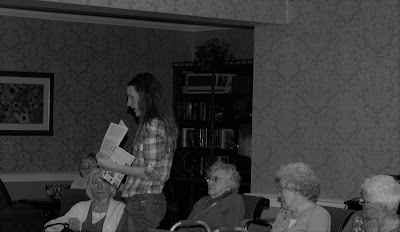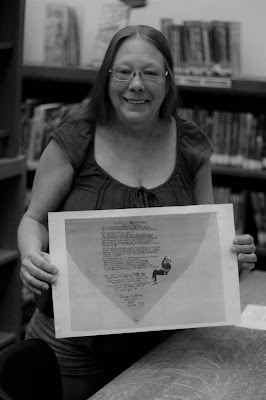in mid-november, a poetry reading with three featured residents happened at country meadows in wyomissing. it would have been four featured residents, but jim dalrymple died just as the second volume of poetry from this project came out. so we went over his poem first, which is the first in the latest volume of this poetry, to honor and remember him.
then we went through vocalizing the poems about residents dick villforth, kathryn beck, and esther roland.
jessica janiszewski assisted with some of the photography above.
dick villforth's daughter also attended the reading and sat beside him. here is a photograph of him and a long excerpt of his poem. he was born in 1920.
*
in 1938, i mopped up the oil on the floor under the knitting
machines for silk stockings at berkshire knitting mills. they
needed continuous oiling, those machines. to wipe up that oil,
you bent or scooped yourself down low to the ground. on your
hands and knees, you contorted to get up under them, using
rags to soak up signs of excess. at that time, jobs not being
easy to find, i took this one. i don’t remember how, but it
happened. i attended the wyomissing polytechnic institute
for a year and then quit to work at that mill, a dumb thing
to do, i can admit now. they taught me cleanup work, at first.
assigned to two machines which sat across from each other, i
assisted another knitter. he illustrated the steps of the actual
knitting work with hosiery where the single mapped line
of a seam ran from the foot to the unseen territory beneath
a skirt or dress. i didn’t stay at 20 cents an hour for long
while working there, i know that. one main problem came
from how the thread could easily tear. silk in thread-form
is difficult. you had to keep everything around the machines
clean. if a splotch of oil met a single leg of hosiery or two
in a pair, you had to throw it all away. we experimented
with some synthetic fibers, like nylon, which wallace hume
carothers invented in 1935. two years later, he sipped
one last beverage—lemon juice and potassium cyanide—
in a hotel room in philadelphia, never learning just how
successful that material would be. in 1941, i left those knitting
machines instead for the draft, the u.s. army air corps...
*




















































